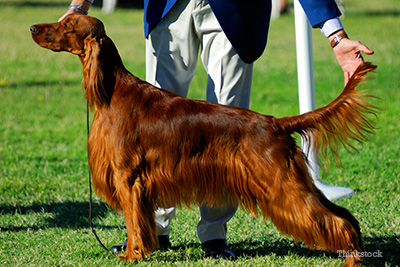
Recently, the Huffington Post reported that several dogs (including a Shih Tzu, West Highland white terrier and an Afghan hound) became ill at the Crufts Dog Show in Birmingham, England. According to the Daily Beast, show veterinarians expressed concern that some of these dogs may have been poisoned.
One of the show dogs, an award-winning Irish setter commonly known as Jagger, collapsed and died shortly after returning back home to Belgium. On autopsy, beef laced with poison was found within the stomach of Jagger.
While we don’t know if Jagger’s death was a result of malicious poisoning or not (toxicology laboratory tests are still pending), what I do know is that poisons don’t typically cause acute, sudden death.
As an emergency-critical-care veterinary specialist and toxicologist, I can attest that most poisons cause more obvious clinical signs first, such as vomiting, hyperactivity, panting, a racing heart rate and tremors or seizures. Sudden death is rarely seen with poisonings, as more apparent clinical signs are typically seen first.
When in doubt, it’s always important to monitor your dog for any signs that warrant an emergency visit to the veterinarian, even if it’s in the middle of the night.
Here are a few clinical signs to look for that may be seen with poisoning cases:
- Foaming at the mouth
- Drooling excessively
- Not eating
- Lethargy
- Agitation
- Vomiting
- Diarrhea
- An elevated heart rate
- Pale gums
- Excessive thirst or urination
- Acting drunk or “out of it”
- Panting excessively
- Difficulty breathing
- Tremors
- Muscle twitching
- Seizures
- Coma
- Collapse
If you think your dog is poisoned, seek immediate veterinary attention. Remember, don’t wait until your dog is severely affected by the poison. In fact, with poisonings, the sooner you recognize that your dog is poisoned and seek veterinary attention, the less expensive it will be for you and the safer it will be for your dog. When in doubt, contact your veterinarian, emergency veterinarian or ASPCA Animal Poison Control Center at (888) 426-4435 for life-saving advice 24/7.
If you have any questions or concerns, you should always visit or call your veterinarian -- they are your best resource to ensure the health and well-being of your pets.
